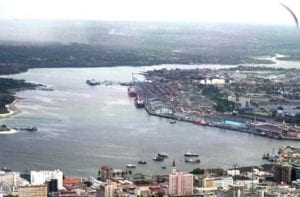A dozen troubled years after its inception, the Dube Tradeport at the King Shaka International Airport north of Durban seems to have finally shed its white elephant image and is (pardon the pun) taking off.
Despite the recent collapse of a Durban-to-London deal with Comair and turbulence in the international aviation industry, the Aerotropolis is quietly taking shape, with 18 freight forwarding companies already setting up shop on its premises and its agricultural component running full steam ahead. The first stage of the overall project consists of the relocation of the Durban airport to King Shaka itself – a secure, automated cargo terminal linked to a 30 hectare TradeZone, a sophisticated AgriZone and the 12ha Dube City green office park. It was recently completed at a cost of R8bn in a joint project between the KwaZulu-Natal provincial government and Airports Company South Africa. The eventual project will, according to Dube chief executive Rohan Persad, take up about 2 040ha as part of a 60-year master plan for a massive trading and logistics precinct linked to the Durban harbour, and rail and road routes to Gauteng and neighbouring provinces. The philosophy behind Dube, says Persad, is about providing industry and agriculture with a purpose-built facility aimed at getting cargo in and out of Durban as quickly and securely as possible to reach domestic, regional and international markets. “It’s really about making sure that the port and the airport talk to each other, that we can ensure speed and efficiency for companies wanting to use air as part of their supply chain. “In the modern global environment, getting products to markets quickly and securely is crucial. “This allows us to compete as a purpose-built facility that brings the port and the airport into a more efficient system,’’ he says. Three weeks ago, the city’s biggest perishable mover signed a R300m investment deal with Dube to take up 18 sites as part of the company’s plan to start making use of air freight in addition to road, sea and rail. The moves mean that the existing warehousing facility is now 30% full and work can begin on the next phase of the project. Persad and provincial economic development MEC Mike Mabuyakhulu believe the recent deal struck with SA Express to run regional flights out of King Shaka to Zambia and Zimbabwe from June is a big step in the right direction, with the carrier planning to eventually base itself at Dube and run at least 10 routes out of King Shaka. Next comes the creation of a link road from the cargo terminal to the Watson Highway and the creation of a light rail link from nearby Ballito through Dube to Durban, which will also improve the flow of goods in and out of the area. Persad’s team is also focusing on Dube’s development of property, trying to draw an international investor for its airport hotel component after the collapse of two deals last year. Despite the failure to attract international carriers, King Shaka last year carried about 179 000 international passengers and about 35 000 tons of cargo.A recent City Press visit to Dube, a 30-minute drive north of Durban, revealed remarkable progress at the site buried in what has historically been sugar cane land. Preparatory work on the road link has begun, as have extensions to the AgriZone.
The freight forwarding facility is busy and construction has been completed on a secure area for high-value goods in transit. KwaZulu-Natal Tourism chief executive Ndabo Khoza told the recently held Tourism Indaba in the city that the authority was going all out to try to attract the international carriers needed to make King Shaka – and Dube – viable. “We have been chasing international airlines to come into King Shaka International Airport. It’s an obsession for us because we have to get the new airport working optimally,” he said. “Considering the global challenges facing the airline industry, maybe it’s time they consider changing the way they do business. “Middle Eastern airlines such as Emirates are growing because they are innovating in the aviation space. “Emirates is backing Durban and plans to bring a bigger Boeing 777 on the daily route to Dubai from June.” Mabuyakhulu echoed these sentiments. “Most international airlines work on a five-year planning cycle and . . . we believe that many airlines will see the value of utilising the airport. “Our determination to attract major airlines to the airport remains unshaken,” he said. “We are under no illusion about the challenges facing the aviation industry globally. The industry is in a bit of an economic tailspin and few (airlines) are looking at new routes.” Source: http://www.fin24.com






